Measure and Evaluate Your Website Performance
With today’s technology, having a website that performs well is imperative to the success of any online business or organization. Website...
4 min read
Mark Parent
January 21, 2020 9:27:26 AM EST

Your website is critical to your company’s success. From an inbound marketing perspective, a website is a company’s best sales tool, meant to attract prospects and convert them into sales-ready leads.
But company websites often fulfill many different purposes and serve a variety of audiences -- prospects, customers, employees, job candidates, perhaps the media, maybe even governmental and regulatory agencies, depending on your industry.
With so many internal stakeholders dependent on the website, how do you know if your site is performing as intended? We’ve got you covered. We’ve been building websites for nearly 20 years. Based upon our experience, here are five must-have website measurement tools every business needs to know how their site is doing.
Optimize Your Website Performance. Schedule a Free Consultation Today.
Google Analytics is the granddaddy of website measurement. As the de facto gatekeeper of the internet, Google has a gold mine of data at its fingertips, data it gladly shares with webmasters via Google Analytics.
Google Analytics is a free website analytics service that provides insights into how users find your website and what they do once they are there. You can analyze visitors and their behavior across dozens of dimensions and criteria.
You can create custom dashboards and assign other users, such as your marketing agency, to view the data. Google Analytics also has robust reporting capabilities. You can generate reports in PDF as well as XLS and CSV formats. Google Analytics also connects with other platforms such as WordPress and HubSpot, allowing you to view GA data from those systems.
To install Google Analytics, all you have to do is place a small tracking code on each page of your website. Once installed, you will be able to track your site according to visitor acquisition (where do your visitors come from), visitor behavior (what visitors do while on your site), and visitor conversions (where and why are visitors converting on the site).
Google Analytics measures:
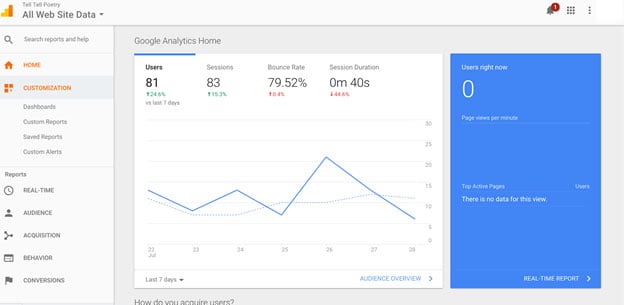
Google Search Console is a free service offered by Google that helps you monitor, maintain, and troubleshoot your site's presence in Google Search results. You don't have to sign up for Search Console to be included in Google Search results, but Search Console helps you understand and improve how Google sees your site.
Search Console helps you:
Search Console is valuable to all types of users, from business owners to technical webmasters to digital markers.
From a search engine optimization (SEO) perspective, Search Console helps you monitor your website traffic, optimize your ranking, and make informed decisions about the appearance of your site's search results. You can use the information in Search Console to influence technical decisions for the website and do sophisticated marketing analysis in conjunction with other Google tools like Analytics, Google Trends, and Google Ads.
Adding a site to Search Console is a very simple process. First, log into your Search Console account. Once you're logged in, enter your URL and click the red “Add a Property” button. Search Console will ask you to verify your site. There are various ways to do this. The easiest way is by allowing Search Console to detect your Google Analytics code. In fact, this is the recommended method by Google.
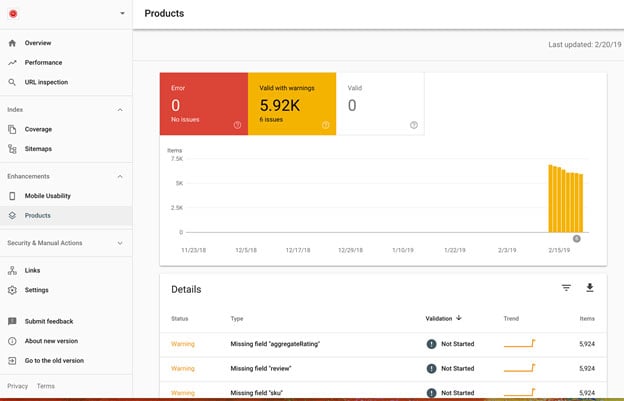
SEMrush is an all-in-one tool suite for improving online visibility and discovering marketing insights. The applications tools and reports are able to help marketers that work in the following services:
One of the platform’s most valuable features is Site Audit. This website SEO analysis tool will help you find and fix on-site issues and boost SEO optimization.
The tool crawls your site and checks its SEO health and prioritizes SEO issues so you can decide what to fix first. It grades your site on a 0 to 100% scale in an easy-to-read dashboard.
The tools ensure the security of your website with HTTPS checks, while also detecting all possible AMP implementation issues. The tool tracks your SEO optimization progress across time, too, so you can gauge your improvements.
The Overview Report will show you the top issues, and the most frequently found problems on your website. If you want to fix a particular issue throughout your entire website, then go to the Issues report, and display the URLs of all webpages affected by the issue. The Page report will list all issues found on a landing page.
SEMrush is extremely easy to use and provides clear instructions on what needs to be fixed. At Inbound 281, we use SEMrush on a weekly basis to monitor and fine-tune our own site as well as the sites of our clients.
SEMrush is a must-have for any organization serious about keeping their website technically healthy and high ranking.
Want to see the SEMrush site audit tool in action? Get a free report here.
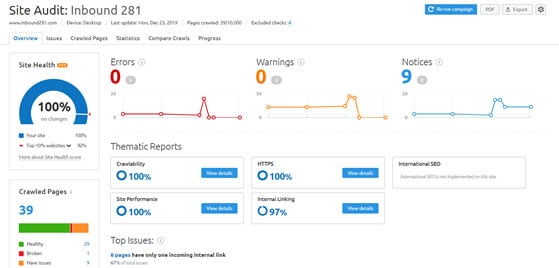
Your website looks good — but how are visitors using it? Imagine if you could look over the shoulder of your site visitors and watch what they do, where they look, how far they scroll, and where they click.
That’s what Hotjar lets you do. It’s like a magic ball into the behavior of visitors on your site. It’s the next best thing to expensive and time-consuming focus groups.
Hotjar is a behavior analytics and user feedback service that helps you understand the behavior of your website users and get their feedback through tools such as heatmaps, session recordings, and surveys. Specifically, Hotjar displays heat maps of your website so you can monitor page engagement.
With Hotjar, you are provided:
Hotjar complements data from traditional web analytics tools like Google Analytics. With Hotjar, you get a window into the world of your users. Its visual interface makes understanding the insights more intuitive and easier than pouring through reams of numbers.
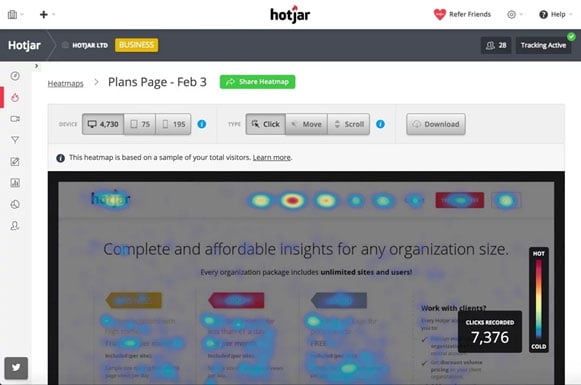
HubSpot’s website grader is a free tool to measure four aspects of your website:
To use the grader, all you do is input your website URL and email, and let the grader do the work. You will get an overall score, plus a breakdown according to each area of the report.
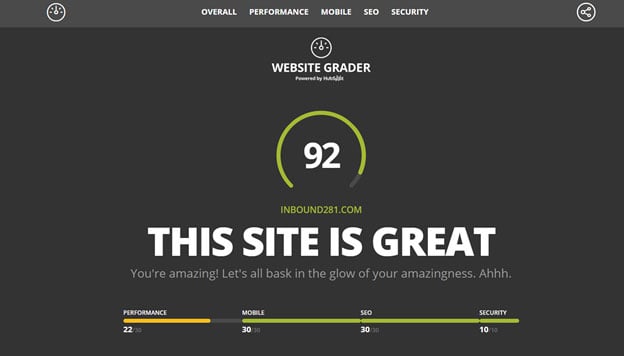
Interested in learning how to measure and optimize your website’s performance? Schedule a free consultation today with an Inbound 281 digital marketing strategist.
.png)
With today’s technology, having a website that performs well is imperative to the success of any online business or organization. Website...

You want your website to not only impress visitors with its beauty and style, but also to serve as a marketing machine for your business. Turning a...

Your website isn't just a digital business card. It's a powerful marketing tool -- if you harness its power and make it work for you. Websites are...